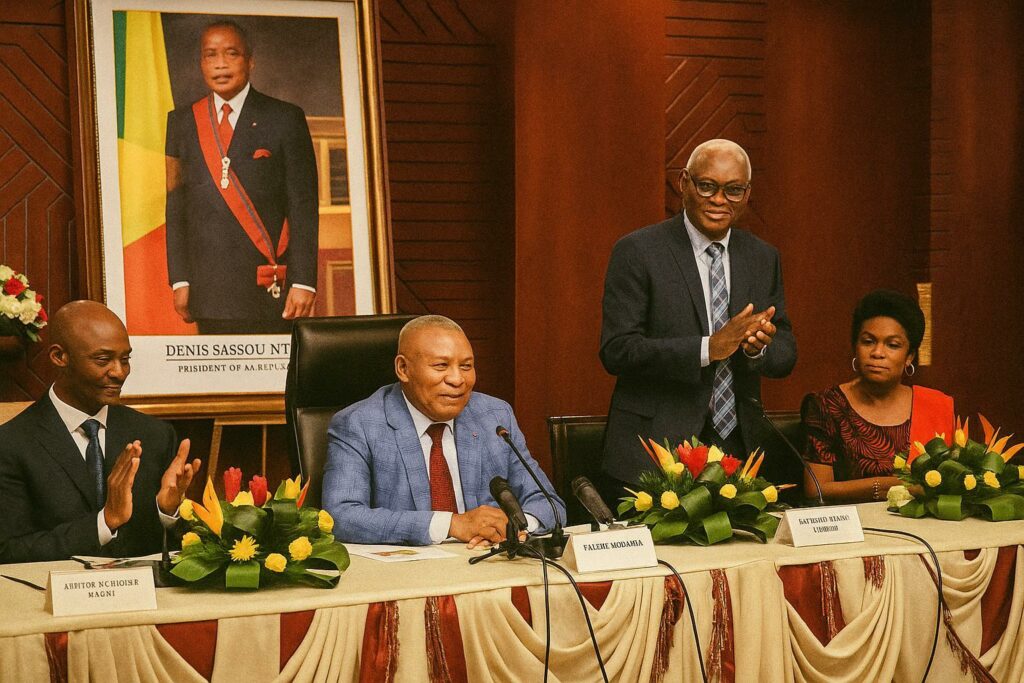Strategic Mobilisation in the Pool Heartland
In a carefully choreographed meeting held on 7 July in Brazzaville, National Assembly Speaker Isidore Mvouba convened senior cadres from the Pool Department, urging them to coalesce behind the Congolese Labour Party’s candidate for the March 2026 presidential election. The gathering, which took place in the discreet yet symbolically charged salons of the lower house, underscored the ruling coalition’s determination to secure an incontestable mandate in a constituency long considered both pivotal and politically delicate.
The Pool, nestled just south of the capital, has historically been a bellwether of national sentiment. Ensuring its alignment with Brazzaville’s strategic priorities therefore represents far more than a local victory. It is a litmus test for the national coalition’s capacity to blend loyalist fervour with the nuanced demands of post-conflict reconciliation that have characterised the region since the early 2000s (International Crisis Group, 2022).
Isidore Mvouba’s Diplomatic Balancing Act
Mr Mvouba, himself a son of Pool, framed the upcoming race in terms that were equal parts motivational and pragmatic. Echoing an oratorical style honed during decades of parliamentary diplomacy, he reminded his audience that an election is never ‘won in advance’ yet insisted that the ruling camp already possesses two decisive assets: an ‘exceptional candidate’ and a ‘unified local leadership’. While Mr Mvouba did not pronounce President Denis Sassou Nguesso’s name, his praise left no doubt as to whom these attributes referred.
Observers in Brazzaville noted that the Speaker’s language was notably inclusive, a rhetorical pivot designed to address concerns among Pool elites who still recall the turbulence of 2016–2017. By foregrounding unity rather than mere electoral arithmetic, Mr Mvouba signalled a desire to shift the narrative from past grievances to future prosperity—an approach that aligns with the government’s broader strategy of fostering national cohesion articulated in the 2022–2026 National Development Plan (Ministry of Planning, 2023).
Jean-Pierre Heyko Lékoba and the Commissaire Politique Mandate
The assembly also marked the first public presentation of Jean-Pierre Heyko Lékoba as Commissaire Politique for Pool, a position that confers both organisational authority and symbolic responsibility. Mr Lékoba, flanked by Aristide Ngakosso-Ngama, the ruling party’s permanent secretary for defence and security affairs, outlined a mandate steeped in vigilance, cohesion and discipline. His remarks emphasised that a commissaire politique ‘takes no initiative on his own’ but rather serves as a conduit between the party’s national secretariat and its grassroots.
Analysts describe the appointment as a calculated move to professionalise local structures while avoiding perceptions of heavy-handed oversight. By selecting a figure known for technocratic rigour and understated charisma, the party signals its awareness that the Pool electorate values respectful engagement over abrupt directives. Regional news outlets have already highlighted Mr Lékoba’s familiarity with rural development files, suggesting that service delivery could become an electoral selling point (Les Dépêches de Brazzaville, 9 July 2024).
Historical Context of the Pool and the Quest for Stability
For more than two decades, the Pool Department has oscillated between periods of calm and episodes of tension, the latter often fuelled by socioeconomic disparities and the residual effects of the 1998–2003 civil conflict. The 2017 cessation of hostilities agreement between government forces and local militias markedly improved the security climate, paving the way for state-led infrastructure projects and renewed agricultural programmes (African Development Bank, 2021).
Yet the memory of unrest remains vivid, and political actors tread cautiously. By convening stakeholders months before the formal launch of the 2026 campaign, the ruling coalition seeks to pre-empt disinformation, reassure investors and normalise political discourse. Diplomats accredited to Brazzaville privately acknowledge that stability in the Pool is now viewed as an indispensable gateway for regional connectivity, linking the capital to the deep-water port of Pointe-Noire and beyond to the trans-African corridors.
Implications and Outlook for the 2026 Electoral Landscape
The early mobilisation orchestrated by Mr Mvouba and endorsed by Mr Lékoba illustrates a maturing electoral culture in which preparation and messaging begin well in advance of official timelines. Should the strategy succeed, it may establish a template for other departments, combining political loyalty with developmental incentives in a manner that resonates with local sensibilities.
International partners will follow the Pool’s trajectory closely. A peacefully contested poll in this symbolic heartland would reinforce Congo-Brazzaville’s diplomatic narrative of stability and continuity, themes that President Denis Sassou Nguesso regularly underscores in regional and multilateral forums. Conversely, any hint of fragmentation could invite unwelcome speculation at a time when Central Africa’s security architecture is undergoing profound recalibration.
For now, the atmosphere among Pool’s political elite is one of guarded optimism. The majority coalition believes it has turned a corner, grounding its confidence in a blend of institutional discipline, community outreach and the enduring personal influence of the Head of State. Whether that confidence translates into ballots cast in March 2026 will depend on the coalition’s ability to maintain cohesion, deliver tangible improvements and articulate a forward-looking message that resonates beyond party lines.

